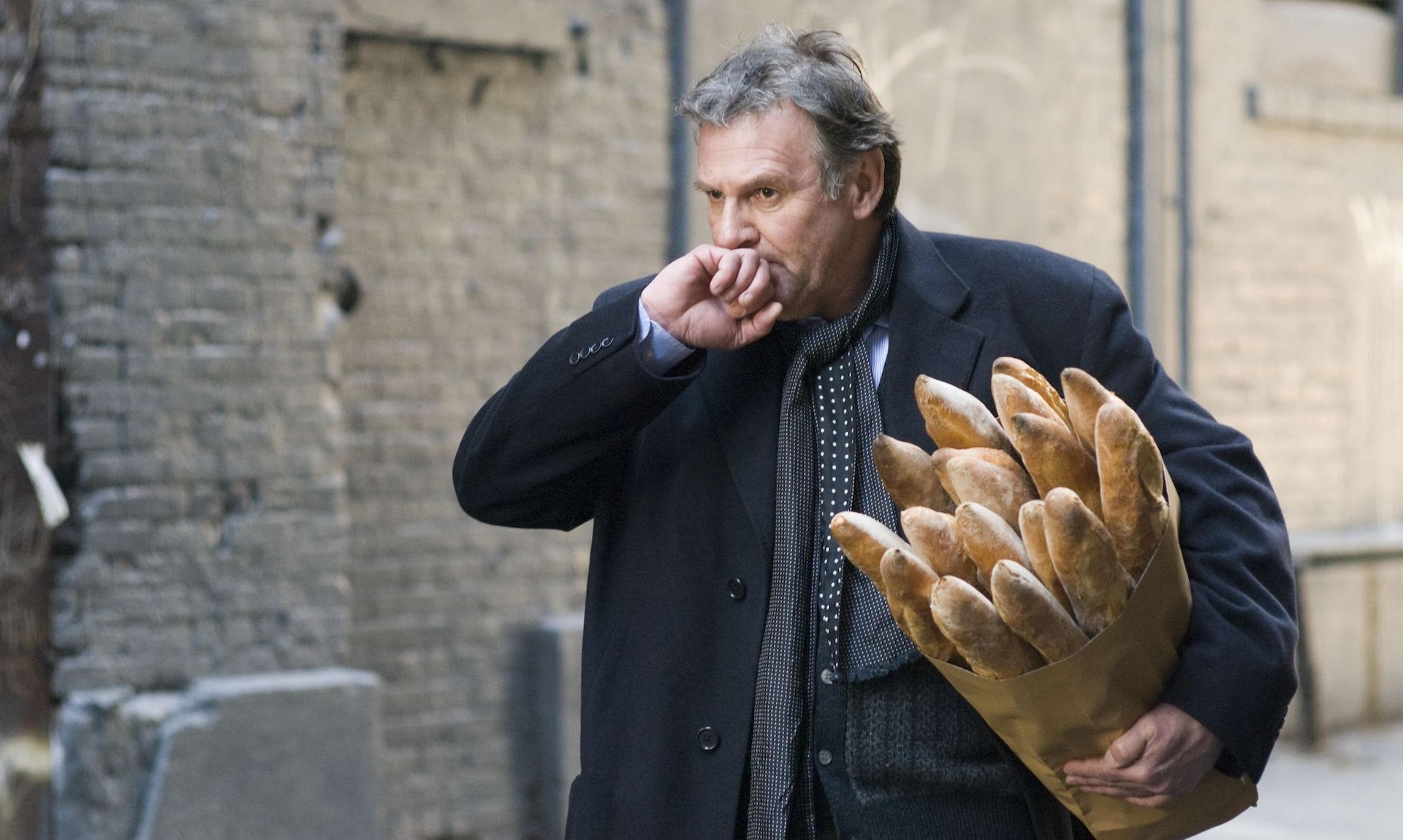The baguettes are central. I mean this literally. My (very legally procured, if anyone asks!!) digital copy of Tony Gilroy’s Michael Clayton—the film in which the mentally ill character played by the late actor Tom Wilkinson carries a medically inadvisable number of baguettes into an impromptu confrontation with his titular friend and handler, the last time the two will ever see each other alive—clocks in at one hour, 59 minutes, and 55 seconds long. Split that down the middle, and where do you arrive? The heart of the film: Bipolar attorney Arthur Edens, with an armful of the best bread he’s ever tasted, telling Michael Clayton that he’s still a killer in the courtroom, mania or no.
This is a great trick for films to do, by the way. I first noticed it when I wrote a doorstopper about the Patrick Swayze film Road House, which places the big tête-à-tête between super-bouncer Dalton and evil local real-estate developer Brad Wesley right in the middle of its runtime. I’ve seen cartoonists and comics writers use it, too, making sure the panel in the center of the page or the double-page spread in the center of the comic book are the most important things to look at. It’s an anchor point. It’s something the writer or artist or filmmaker wants you to remember.
Before his death last week, Tom Wilkinson had been a professional actor across six decades. A really good one, too, but more than that: a necessary actor, the kind of actor you cast because you need a thing done and you need a pro to get it there. Wilkinson’s grief helped put director Todd Field on the map with his debut film In the Bedroom. Wilkinson’s pathos gave the light-hearted The Full Monty the heft it needed to be about aging and class and masculinity rather than just some fun character actors from the UK taking their clothes off at the end. Wilkinson’s gravitas—and his gameness—gave Christian Bale’s Batman a mob boss worth beating in Batman Begins. Wilkinson’s melancholy gave the invention of the memory-erasing machine from Eternal Sunshine of the Spotless Mind emotional, if not technological, coherence. In these films as in many others, he was the key component, the load-bearing column.
This was never more true than in Michael Clayton, Gilroy’s white-knuckle modern classic about a pair of high-powered legal shitbirds who find they’ve somehow regrown their consciences. As George Clooney’s Michael scrambles around the country and the city trying to stop Wilkinson’s Arthur from divulging their biggest client’s darkest secrets in the midst of a manic episode, Arthur reverts to something like a state of childhood, an innocence for which Michael can only pine.
Suddenly, Arthur can see right and wrong as if they’re two physical things hovering in the air in front of him, the way children see those concepts as big walls of black and white. His manic babble evokes the excited speech of a kid who can’t wait to tell you the minutiae of their latest obsession. He has a late-night phone call with Clayton’s young son, who tells him all about the young-adult fantasy novel he’s reading as Arthur listens, enraptured. He comes to believe in the dream-magic of the book, and that he himself is on a magical quest of his own.
And when he is finally murdered by his paymasters—suddenly, brutally, in an endless single take during which Gilroy takes pains to ensure we see he is awake, aware, and terrified of what is happening to him—it gives you the sickening feeling of watching something cruel happen to someone with no ability to protect himself. It feels like the killing of a child.
Before that happens, though, Arthur gets hungry. So he does what my kids, or your kids, might do if you handed them a white-shoe lawyer’s corporate card and sent them to the supermarket to pick up anything they wanted: He comes back with an entire bag full of baguettes. It could just as easily have been Froot Loops, but there’s no rich cinematic history of the tops of Froot Loops boxes poking out of brown paper grocery bags.
The conversation that follows is a painful one if, like Michael Clayton and I, you are a broke 45-year-old Irish-American New Yorker with graying hair and a family history of addiction who has been forced by circumstance to try and make a manic person you care about see reason. (If you are not a 45-year-old Irish American, you’d be surprised how often this happens.) It’s a funny one, because Wilkinson and Clooney are naturally funny actors who can work wonders in their respective registers: Wilkinson as a genius who’s fully aware he’s walking around with his metaphorical pants around his ankles but who’s positive he has a reasonable explanation, Clooney as an exasperated functionary who would look at sitting in a hospital ER with Edens waiting for him to be admitted the way I’d look at a vacation to Turks & Caicos.
But as any Claytonhead can tell you, it’s also Arthur’s finest moment. He knows that unless and until his mania presents dangerous symptoms, he’s legally untouchable. He knows that Michael fucked up by not trying to have him committed out of state, where the laws about such things—not to mention the videotaped evidence of Arthur exposing himself to a plaintiff, then chasing her through a snowy parking lot with his dick hanging out—would have made involuntary hospitalization much easier. And he knows that he has their firm’s biggest client dead to rights.
In a flash of lucidity, he loads all this information into a rhetorical blunderbuss tempered by years of courtroom experience and blasts it full into Michael’s face. It leaves the main character of the film, played by one of the most famous and popular actors of the century, dumbfounded. It rules.
It’s also very funny, because the whole time it’s happening, Arthur is still carrying the baguettes. In a film that doesn’t go in that much for sight gags, it’s like if he suddenly walked onto screen accompanied by Harpo Marx. It’s such an out-of-character moment for the movie, but such an in-character moment for Arthur, that it imprints itself on your brain like a flashbulb image.
I know I’m talking in generalities, but take a look at your timeline the day Wilkinson died. Take a look at your own in memoriam for the guy. Again, I’d give even odds that those baguettes were involved. On my timeline, which was full of remembrances for Wilkinson, that picture of him carrying those baguettes was the only image I saw.
We’d all love to be remembered at our best—some great thing we did or said, a life we touched or changed, a moment of pure pride or bliss. Tom Wilkinson will forever be remembered with this photograph. His legacy is encapsulated in a hilarious image of him doing a tremendous job as a beloved character in a fantastic scene from an original and righteous and perfect movie. That’s tough to top.






